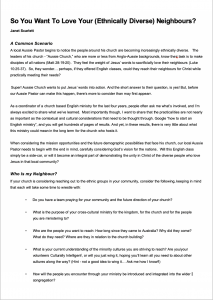A Common Scenario
A local Aussie Pastor begins to notice the people around his church are becoming increasingly ethnically diverse. The leaders of his church – “Aussie Church,” who are more or less from Anglo-Aussie backgrounds, know their task is to make disciples of all nations (Matt 28:19-20). They feel the weight of Jesus’ words to sacrificially love their neighbours (Luke 10:25-37). So, they wonder… perhaps, if they offered English classes, could they reach their neighbours for Christ while practically meeting their needs?
Super! Aussie Church wants to put Jesus’ words into action. And the short answer to their question, is yes! But, before our Aussie Pastor can make this happen, there’s more to consider than may first appear.
As a coordinator of a church based English ministry for the last four years, people often ask me what’s involved, and I’m always excited to share what we’ve learned. Most importantly though, I want to share that the practicalities are not nearly as important as the contextual and cultural considerations that need to be thought through. Google “how to start an English ministry”, and you will get hundreds of pages of results. And yet, in these results, there is very little about what this ministry could mean in the long term for the church who hosts it.
When considering the mission opportunities and the future demographic possibilities that face his church, our local Aussie Pastor needs to begin with the end in mind, carefully considering God’s vision for the nations. Will this English class simply be a side-car, or will it become an integral part of demonstrating the unity in Christ of the diverse people who love Jesus in that local community?
Who Is my Neighbour?
If your church is considering reaching out to the ethnic groups in your community, consider the following, keeping in mind that each will take some time to wrestle with:
• Do you have a team praying for your community and the future direction of your church?
• What is the purpose of your cross-cultural ministry for the kingdom, for the church and for the people you are ministering to?
• Who are the people you want to reach: How long since they came to Australia? Why did they come? What do they need? Where are they in relation to the church building?
• What is your current understanding of the minority cultures you are striving to reach? Are you/your volunteers Culturally Intelligent, or will you just wing it, hoping you’ll learn all you need to about other cultures along the way? (Hint – not a good idea to wing it… Ask me how I know!!)
• How will the people you encounter through your ministry be introduced and integrated into the wider congregation?
• If you do manage to integrate the two groups, will the inclusion of a culturally diverse group of people change the way you do church? How? In what ways? Why?
• What is your current understanding of Australian Culture (yes, we do have a culture!) and your own cultural preferences and biases? How does that find its expression in your churches’ culture?
When thinking about who your neighbours are and what they might need, one great place to start is the Australian Bureau of Statistics. They offer a Community Profile of every suburb in Australia, listing ethnic make-up, languages spoken at home, percentages of people at work, as well as how many are studying or on welfare. The ABS provides facts to guide your decision-making process. For example – Which nationalities are represented in your neighbourhood? Are they refugees or economic migrants? You may have some idea from your own observations, but hard data is more reliable. Think of the time spent in the ABS data as an investment in the future of the kingdom; as an act of submission and humility.
Are You “The one who had compassion”?
And once you get that far, you may discover that English is not your neighbours’ highest consideration. Once you get alongside them and hear their stories, you may find they they may be socially isolated, or they struggle with housing insecurity, the demands of young children or unemployment. They may be economic migrants looking for a better life for their family, and so are usually busy working and studying, but would really appreciate homework help for their children. How can you best love them, then?
Not that English classes aren’t a valid form of cross-cultural outreach. Running an English class can be a fabulous, fruitful and exciting mission opportunity! It can mean the privilege of leading some people through the gospel, while for others you can become links in the chain that leads them to Christ. But without a consistent focus on Christ, a relentless commitment to hospitality and multi-ethnicity in your church congregation, alongside simple presentations of the Gospel, your ministry may just become a community service.
Please understand, all these questions and probing are coming from a position of mistakes made and lessons hard learned. We began Southside English for Life full of good intentions – wanting to love our community and share the gospel. However, we didn’t spend time in the data until years after we began. We learned about the nuances and values of other cultures as we went along, and no doubt offended many in the process! In addition to that, every thought of how to integrate our migrants with the church community was based on hopeful intentions, rather than solid, unified strategies. While we have led people to Christ through the ministry, Southside English For Life was initially more aspirational than it was effective! It’s only now we are beginning to think through a whole church approach to multi-ethnic ministry, so as to best reach our 60% non-English speaking neighbourhood with the good news of Christ.
Will you “Go and do likewise” or will you “pass by”?
So, what would you say to Pastor Aussie? Would you tell him to start that English Ministry, Field of Dreams style?
I would commend Pastor Aussie and his leaders for wanting to meet their neighbours’ needs, but I would suggest they put the idea of English classes on hold while they get to know the people in their neighbourhood – on ABS and in person. The leaders must pray; think deeply about and plan for the future of Aussie church’s congregation and what they want it to look like in 5 years – do they want to reflect not only the demography of their locality, but become that fabulous picture of the great multi-ethnic multitude worshipping together in Revelations?
Finally, I would encourage them to think broadly and play to their strengths. To work out how their existing outreach ministries – youth, play group, recreational sports groups, etc. can cater for the needs of the migrants in their area. Don’t simply relegate multi-ethnic outreach ministry to the one team running English classes! If your neighbourhood is multi-ethnic, all your outreach ministries should also be.
What it comes down to, as for every ministry and outreach, is prayer and research, followed by loving action. Know your context! Know your neighbours’ and then commit to love wholeheartedly, as they need to be loved, not simply in the way we feel best equipped, because:
…there before me was a great multitude that no one could count, from every nation, tribe, people and language, standing before the throne and before the Lamb… And they cried out in a loud voice:
“Salvation belongs to our God,
who sits on the throne,
and to the Lamb.” Rev 7:9-10
Janet is the Cross-Cultural Ministry Worker at Southside Presbyterian. She leads the English for Life Ministry and consults on cross-cultural matters with other ministries within the church.


